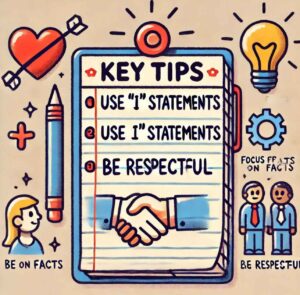Welcome Blessings!
(Tap 🔽 to see more topics!)


Tell the truth, but tell it slant, as the saying goes. That knot in your stomach when you know you need to say something but are terrified of how it’ll land. Or maybe you’ve been on the other side, feeling like someone’s words are a punch to the gut, even if they claim they’re just “being honest.” This whole truth-telling thing is a tricky dance. You want to be accurate but don’t want to start a war or crush someone’s spirit.
We’ve all wondered how to share what’s on our minds without turning it into a blame-fest. You know, those moments when you desperately want to express something, but you’re stuck, worried about hurting someone’s feelings or sparking a considerable fight. Or, flip the coin, and you’ve probably been receiving what felt like a verbal attack, even if the person swore they were just being truthful.
Remember, you know what, you can handle the truth! Honesty matters. But so does kindness. Blaming someone feels awful, but so does dodging the truth. So, how do we find that sweet spot? How do we speak our minds without turning everything into a blame game?
This article is your guide to understanding the difference between speaking your truth and throwing blame around and why it’s so crucial. Today, you will learn practical tips and real-life examples to help you share your thoughts without making others feel attacked. Plus, we’ll talk about handling the truth when it comes your way without feeling like you’re being unfairly criticized.
Here is the thing: telling the truth is like laying out the facts on a table, plain and simple. It’s about saying what’s real, what you genuinely feel, or what you’ve observed without twisting it. It’s about being straight but respecting yourself and the other person.
Blaming, on the other hand, is like pointing a finger and saying, “You did this, and it’s all your fault.” It’s about making someone feel guilty or ashamed; it often comes from frustration or anger. It disregards the other person’s feelings and dignity.

The simple way to see the core difference is as follows:
Telling the truth
Blaming
Thus, telling the truth is about sharing what happened, while blaming is about saying who is at fault, often with a heavy dose of judgment. It’s the difference between saying, “The dishes are still in the sink,” and “You always leave the dishes in the sink!” See how one is just a fact, and the other is a personal attack?
We all know that feeling when someone’s words make us feel small or defensive. That’s usually blame sneaking in. Focusing on just the facts opens up a space for understanding and problem-solving instead of just creating more tension.
The fact is that telling the truth and pointing fingers have different outcomes. Think of it like-
Telling the Truth
Blaming
And it’s not just about how others see you. It’s about how you feel, too.
Telling the Truth
Blaming
So, telling the truth opens doors to positive change while blaming shuts them down. It’s about choosing connection over conflict and growth over stagnation.
1. Use “I” Statements Instead of “You” Statements
Imagine telling a friend, “You never keep your word.” That sounds like an accusation, prompting them to defend themselves. A better approach: “I feel disappointed when plans get canceled at the last minute because I was looking forward to seeing you.”
It shifts the focus to your feelings rather than blaming them. Similarly, instead of saying, “You’re careless with money,” try, “I feel anxious when unexpected expenses come up because I like to plan.”
The first statement sparks defensiveness, while the second invites conversation.
2. Focus on Facts, Not Assumptions
Let’s say a coworker missed a deadline. Instead of saying, “You’re irresponsible,” which is a judgment, stick to the facts: “The project deadline was missed, which caused delays for the team.”
You encourage open dialogue by focusing on what happened rather than making assumptions. Think of how a news reporter presents information, they share facts, not opinions. That’s the mindset to adopt when expressing the truth.
3. Ask Questions Instead of Making Accusations
If someone told you, “You don’t even care!” you’d likely feel misunderstood or attacked. That’s because it assumes harmful intent. A more constructive approach is to ask rather than assume. Instead of saying, “You don’t care about my feelings,” try, “I’ve noticed that when I bring up concerns, they don’t seem to be addressed. Is there something I’m missing?” Questions encourage dialogue and make the other person more willing to share their perspective, reducing defensiveness.

4. Use Analogies to Explain Without Accusing
Sometimes, people don’t realize how their actions affect others. Instead of blaming them, analogies can illustrate your point non-confrontationally. For instance, if a partner frequently interrupts you, you could say, “Imagine watching an important TV show, but someone keeps changing the TV channel before you finish. That’s how I feel when I get interrupted.” Analogies help create understanding without making the other person feel attacked.
5. Be Solution-Oriented Instead of Problem-Focused
Pair honesty with a constructive way forward rather than dwelling on what went wrong. Instead of saying, “You never listen to me,” try, “I’d appreciate it if we could set aside time to talk without distractions. That way, I feel heard, and we can communicate better.” When truth-telling includes a solution, it fosters growth rather than resentment.
More examples of how to tell the truth without blaming others are as follows;

Below are some proven tips on how to receive the truth without feeling blamed:
Below are some examples of how to receive the truth without feeling blamed:
The bottom line is being honest with people is super important, but how you do it makes all the difference. Remember, honesty is a bright light, but you can either shine it gently or blind someone with it. When you’re throwing blame around, it’s like slamming a door in someone’s face. But when you share your truth with care, it’s like opening a window, letting in fresh air and understanding.
Whether talking to your best friend, dealing with a coworker, or just chatting with someone at the grocery store, learning to speak your truth kindly can change how you connect with others. It’s not always easy, I know. We all slip up sometimes. But it’s a skill worth practicing.
Next time you’ve got something challenging to say, pause for a second. Take a deep breath, and remember: you can be honest and kind. They’re not enemies! You can share what’s real without making someone feel like they’re under attack.
Now, I’m curious. What’s been your experience with this? Have you ever struggled to speak your truth without accidentally throwing blame? Or you’ve had a moment where you nailed it. Please share your thoughts in the comments below, and let’s keep the conversation going! And if you know someone who could help with this, feel free to share this article. Voila! Until next time!